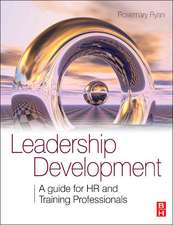Innovation Strategy for the Knowledge Economy
Autor Debra M Amidonen Limba Engleză Paperback – 17 apr 1997
This book provides the reader with a sound, practical framework for instituting innovation strategy beyond the traditional definition of flow of parts or finances. At the core is an understanding of the dual value of knowledge (content) and innovation (process) using 'real-time' learning as the methodology.
Innovation Strategy for the Knowledge Economy introduces new managerial concepts such as:
Value-System versus Value-Chain
Strategic Business Network (SBN) versus Strategic Business Unit (SBU)
Customer Success versus Customer Satisfaction
It is an invaluable resource for both managers and organization leaders.
Debra Mae Amidon is Founder and Chief Strategist of Entovation International, a global innovation research and consulting network with outposts throughout the world. Her specialties include: knowledge management, learning networks, customer innovation, and enterprise transformation. Ms. Amidon holds degrees from Boston University, Columbia and MIT, where she was an Alfred P. Sloan Fellow.
Preț: 207.92 lei
Preț vechi: 363.18 lei
-43% Nou
Puncte Express: 312
Preț estimativ în valută:
39.80€ • 43.24$ • 33.45£
39.80€ • 43.24$ • 33.45£
Carte tipărită la comandă
Livrare economică 21 aprilie-05 mai
Preluare comenzi: 021 569.72.76
Specificații
ISBN-13: 9780750698412
ISBN-10: 0750698411
Pagini: 192
Ilustrații: black & white illustrations
Dimensiuni: 152 x 229 x 18 mm
Greutate: 0.36 kg
Ediția:1
Editura: Taylor & Francis
Colecția Routledge
Locul publicării:Oxford, United Kingdom
ISBN-10: 0750698411
Pagini: 192
Ilustrații: black & white illustrations
Dimensiuni: 152 x 229 x 18 mm
Greutate: 0.36 kg
Ediția:1
Editura: Taylor & Francis
Colecția Routledge
Locul publicării:Oxford, United Kingdom
Public țintă
Professional Practice & DevelopmentCuprins
Chapter 1 A Bold Awakening; Chapter 2 Kaleidoscopic Dynamics; Chapter 3 Wellsprings Timelines; Chapter 4 The Emerging “Community of Knowledge Practice”; Chapter 5 Innovation as a Value System; Chapter 6 An Innovation Management Architecture; Chapter 7 Knowledge Innovation Assessment-Internal Capabilities; Chapter 8 Knowledge Innovation Assessment-External Integration; Chapter 9 Customers as a Source of Knowledge; Chapter 10 Prospectus for the Future;
Recenzii
¦If you have reached a point where you believe that it is essential to tap into the full potential of knowledge in your organization, very few can offer better advice than Debra Amidon. Based on more than a decade of experience in applying insights on knowledge-driven innovation to the reality of business, she offers practical, impactful, and systematic ways to partner with your customers in order to create whole new pathways of value creation.¦¦Hubert Saint-Onge, V.P., People, Knowledge, and Strategies, The Mutual Group (Canada)
'Debra M. Amidon has captured the most forward-thinking ideas in the area of knowledge management and learning organizations and their impact on innovation. These emerging new concepts are effectively and creatively linked together and paint a clear picture of the possibilities of the future.'Gordon P. Petrash, Global Director, Intellectual Asset & Capital Management, The Dow Chemical Company
¦Just when you think you've caught up with the latest in strategic management theory, along comes Debra Amidon to challenge you with new and more exciting possibilities. This book is not intended for the neophyte manager. It is a mind-stretcher for the experienced and sophisticated manager whose corporation expects him or her to keep them well ahead of the competition.¦¦Dr. Bert Westwood, Former V.P., Research and Technology, Sandia National Laboratories and Martin Marietta Corporation.
¦This seminal book places a laser-beam focus on the most important core competency of our time¦innovation¦and stresses the need for the development of solid metrics to measure its performance.¦¦Dr. Corey Carbonara, Vice President for Innovation, Baylor University
¦The knowledge revolution, that we all are experiencing in our own ways, demands a different approach, attitude, and implementation of our management systems¦be they in industry, government, or academia. This book deals with these complex issues in a stimulating and thorough way.¦¦Erich Bloch, Distinguished Fellow, Council on Competitiveness (Washington, D.C.)
¦Debra Amidon has provided a much needed blueprint for how knowledge might be managed systematically, effectively, and profitably. The book points to how management of knowledge is central to continued innovation and supports and complements the other major processes of the enterprise.¦¦Karl Wiig, Chairman & CEO, Knowledge Research Institute, Inc.
¦If you would like to know how to participate in and be part of the fourth wave that is coming, we have to learn how to innovate as an organization. Debra shows us the way to achieve that creative use of the knowledge that exists in the minds of your people so that you can redefine your company to be part of the fourth wave.¦¦Robert H. Buckman, President and CEO, Buckman Laboratories
¦This book should be a wake-up call to small companies, as well as large, if they expect to compete in today's world. Although leaders of small organizations may think that they don't have the resources to pursue knowledge innovation, in fact they have the perfect laboratories for applying Ms. Amidon's strategies. Small companies have the agility, focus, ease of communication, and flexible culture that simplify the implementation of innovation management. Moreover, the supplier and customer alliances that are essential to survival can be readily shaped into a virtual enterprise, or Strategic Business Network, to provide competitive advantage.¦¦Robert Levy, Energy BioSystems Corporation
¦Think about Monet's series paintings¦it's the changing context that gives them meaning and significance, just as context gives knowledge meaning and significance. We all need a Ken Awakening!¦¦Tony Brewer, Wentworth Company, (England)
¦`Ken you?' While this book is not a `Ken-do' management text, it is provocative and does evoke a `Ken' awakening. After reading Amidon's book, you will not be complacent. You will want to move rapidly from an information - and even knowledge source - to one of wisdom. Some people learn to live, innovators live to learn. For the latter, this book should be on their must read list.¦¦Dr. F. Timothy Janis, President, ARAC, former Executive Director, Technology Transfer Society.
¦This book provides a sparkling synthesis of emergent knowledge management practices. Debra Amidon brings clarity and focus to the application of knowledge for product and service innovation. A must read for any organization developing knowledge and innovation strategy.¦¦Verna Allee, author, The Knowledge Evolution
¦The ability to create good metaphors and analogies (and tell good stories) is critical to the success of a theorist in this emerging field. Amidon's Monet metaphor is powerful.¦¦Britton Manascu, editor, Knowledge Inc.
¦When entering uncharted territory it is wise to rely on the guidance of a pioneer explorer. As an early protagonist, Debra Amidon has mastered the elusive concepts of knowledge management. She will introduce you to the intricacies of the emerging economy of knowledge with ease and confidence. If you are looking for a book that gives you a clear picture of knowledge innovation, helps you diagnose your potential and set your own strategy to survive the knowledge imperative, this is it!¦¦Francisco J. Carrillo, Director, Center for Knowledge Systems, ITESM (Mexico)
¦The power of innovation is one of the most fundamental resources for both organization and societal wealth. Ms. Amidon offers insightful and practical hands-on suggestions of how to move ahead with a powerful process for your knowledge innovation.¦¦Leif Edvinsson, from the Foreword
¦This adds up to far more than a timely review of the forces shaping tomorrow's business. It provides senior managers with a framework to take advantage of what is perhaps their organization's most precious, but under-managed resource: knowledge. Everyone reading this book can expect to be rewarded with a new and stimulating vision of how their businesses should be run.¦¦David Harvey, Director, Business Intelligence (England)
¦Exceptionally skilled in building consensus and working on complex issues that require collaborative efforts...with a rare quality of sensitivity and resoluteness.¦¦Dr. George Kozmetsky, Founder, Teledyne Corporation
¦Ms. Amidon displays extensive knowledge of technology transfer. She is articulate and effective in communication of complex ideas and concepts to diverse audiences.¦¦Larry W. Sumney, President and CEO, Semiconductor Research Corporation
¦On my wall is a poster of Monet's `The Water Lily Pond' showing the bridge at Giverny. I look at it to inspire me when I'm planning for the future. Debra's book has the same effect¦it's an excellent bridge between tomorrow and today, and between theory and practice.¦¦David J. Skyrme, editor, I3: Intelligence, Insight, and Innovation
¦Today's world is in the whirl of accelerated change in all domains. Old theories and foundations are dying and the new are not yet invented. Management leaders are living in the dark as to what strategies will make them successful. Exclusive focus on the short term does not enable a vision of the future. Debra's book provides the strategic light with a theory of modern management, precise methods for application and a formula for building the successful knowledge-based enterprise.¦¦Dr. Eunika Mercier-Laurent, EML Conseil-Knowledge Management (France)
¦At Monsanto, the challenge that we have taken upon ourselves is ¦How do we engage the collective intellect of the people in Monsanto to turn information into insight to serve our customers and the marketplace?¦ Debra M. Amidon lucidly explores the concept of knowledge innovation and its criticality for ¦the success of an enterprise, vitality of a nation's economy and the advancement of society.¦ I highly recommend the book.¦¦Bipin Junnarkar, Director, Knowledge Management, Monsanto Company
¦As Debra suggests, the innovation process must be made explicit. In this r
'Debra M. Amidon has captured the most forward-thinking ideas in the area of knowledge management and learning organizations and their impact on innovation. These emerging new concepts are effectively and creatively linked together and paint a clear picture of the possibilities of the future.'Gordon P. Petrash, Global Director, Intellectual Asset & Capital Management, The Dow Chemical Company
¦Just when you think you've caught up with the latest in strategic management theory, along comes Debra Amidon to challenge you with new and more exciting possibilities. This book is not intended for the neophyte manager. It is a mind-stretcher for the experienced and sophisticated manager whose corporation expects him or her to keep them well ahead of the competition.¦¦Dr. Bert Westwood, Former V.P., Research and Technology, Sandia National Laboratories and Martin Marietta Corporation.
¦This seminal book places a laser-beam focus on the most important core competency of our time¦innovation¦and stresses the need for the development of solid metrics to measure its performance.¦¦Dr. Corey Carbonara, Vice President for Innovation, Baylor University
¦The knowledge revolution, that we all are experiencing in our own ways, demands a different approach, attitude, and implementation of our management systems¦be they in industry, government, or academia. This book deals with these complex issues in a stimulating and thorough way.¦¦Erich Bloch, Distinguished Fellow, Council on Competitiveness (Washington, D.C.)
¦Debra Amidon has provided a much needed blueprint for how knowledge might be managed systematically, effectively, and profitably. The book points to how management of knowledge is central to continued innovation and supports and complements the other major processes of the enterprise.¦¦Karl Wiig, Chairman & CEO, Knowledge Research Institute, Inc.
¦If you would like to know how to participate in and be part of the fourth wave that is coming, we have to learn how to innovate as an organization. Debra shows us the way to achieve that creative use of the knowledge that exists in the minds of your people so that you can redefine your company to be part of the fourth wave.¦¦Robert H. Buckman, President and CEO, Buckman Laboratories
¦This book should be a wake-up call to small companies, as well as large, if they expect to compete in today's world. Although leaders of small organizations may think that they don't have the resources to pursue knowledge innovation, in fact they have the perfect laboratories for applying Ms. Amidon's strategies. Small companies have the agility, focus, ease of communication, and flexible culture that simplify the implementation of innovation management. Moreover, the supplier and customer alliances that are essential to survival can be readily shaped into a virtual enterprise, or Strategic Business Network, to provide competitive advantage.¦¦Robert Levy, Energy BioSystems Corporation
¦Think about Monet's series paintings¦it's the changing context that gives them meaning and significance, just as context gives knowledge meaning and significance. We all need a Ken Awakening!¦¦Tony Brewer, Wentworth Company, (England)
¦`Ken you?' While this book is not a `Ken-do' management text, it is provocative and does evoke a `Ken' awakening. After reading Amidon's book, you will not be complacent. You will want to move rapidly from an information - and even knowledge source - to one of wisdom. Some people learn to live, innovators live to learn. For the latter, this book should be on their must read list.¦¦Dr. F. Timothy Janis, President, ARAC, former Executive Director, Technology Transfer Society.
¦This book provides a sparkling synthesis of emergent knowledge management practices. Debra Amidon brings clarity and focus to the application of knowledge for product and service innovation. A must read for any organization developing knowledge and innovation strategy.¦¦Verna Allee, author, The Knowledge Evolution
¦The ability to create good metaphors and analogies (and tell good stories) is critical to the success of a theorist in this emerging field. Amidon's Monet metaphor is powerful.¦¦Britton Manascu, editor, Knowledge Inc.
¦When entering uncharted territory it is wise to rely on the guidance of a pioneer explorer. As an early protagonist, Debra Amidon has mastered the elusive concepts of knowledge management. She will introduce you to the intricacies of the emerging economy of knowledge with ease and confidence. If you are looking for a book that gives you a clear picture of knowledge innovation, helps you diagnose your potential and set your own strategy to survive the knowledge imperative, this is it!¦¦Francisco J. Carrillo, Director, Center for Knowledge Systems, ITESM (Mexico)
¦The power of innovation is one of the most fundamental resources for both organization and societal wealth. Ms. Amidon offers insightful and practical hands-on suggestions of how to move ahead with a powerful process for your knowledge innovation.¦¦Leif Edvinsson, from the Foreword
¦This adds up to far more than a timely review of the forces shaping tomorrow's business. It provides senior managers with a framework to take advantage of what is perhaps their organization's most precious, but under-managed resource: knowledge. Everyone reading this book can expect to be rewarded with a new and stimulating vision of how their businesses should be run.¦¦David Harvey, Director, Business Intelligence (England)
¦Exceptionally skilled in building consensus and working on complex issues that require collaborative efforts...with a rare quality of sensitivity and resoluteness.¦¦Dr. George Kozmetsky, Founder, Teledyne Corporation
¦Ms. Amidon displays extensive knowledge of technology transfer. She is articulate and effective in communication of complex ideas and concepts to diverse audiences.¦¦Larry W. Sumney, President and CEO, Semiconductor Research Corporation
¦On my wall is a poster of Monet's `The Water Lily Pond' showing the bridge at Giverny. I look at it to inspire me when I'm planning for the future. Debra's book has the same effect¦it's an excellent bridge between tomorrow and today, and between theory and practice.¦¦David J. Skyrme, editor, I3: Intelligence, Insight, and Innovation
¦Today's world is in the whirl of accelerated change in all domains. Old theories and foundations are dying and the new are not yet invented. Management leaders are living in the dark as to what strategies will make them successful. Exclusive focus on the short term does not enable a vision of the future. Debra's book provides the strategic light with a theory of modern management, precise methods for application and a formula for building the successful knowledge-based enterprise.¦¦Dr. Eunika Mercier-Laurent, EML Conseil-Knowledge Management (France)
¦At Monsanto, the challenge that we have taken upon ourselves is ¦How do we engage the collective intellect of the people in Monsanto to turn information into insight to serve our customers and the marketplace?¦ Debra M. Amidon lucidly explores the concept of knowledge innovation and its criticality for ¦the success of an enterprise, vitality of a nation's economy and the advancement of society.¦ I highly recommend the book.¦¦Bipin Junnarkar, Director, Knowledge Management, Monsanto Company
¦As Debra suggests, the innovation process must be made explicit. In this r
Descriere
Innovation Strategy for the Knowledge Economy is intended for managers who have practiced the best of quality and re-engineering management techniques and are ready to transform their organizations with the systematic notions of knowledge creation and application. It is for organization leaders who prefer to be inspired with innovation strategy than hit over the head with change management techniques. It does not deal with barriers, hurdles, or conflicts to be resolved; rather, it paints a possible vision of how we can take advantage of our collective learning to move an enterprise forward.
This book provides the reader with a sound, practical framework for instituting innovation strategy beyond the traditional definition of flow of parts or finances. At the core is an understanding of the dual value of knowledge (content) and innovation (process) using 'real-time' learning as the methodology.
Innovation Strategy for the Knowledge Economy introduces new managerial concepts such as:
Value-System versus Value-Chain
Strategic Business Network (SBN) versus Strategic Business Unit (SBU)
Customer Success versus Customer Satisfaction
It is an invaluable resource for both managers and organization leaders.
Debra Mae Amidon is Founder and Chief Strategist of Entovation International, a global innovation research and consulting network with outposts throughout the world. Her specialties include: knowledge management, learning networks, customer innovation, and enterprise transformation. Ms. Amidon holds degrees from Boston University, Columbia and MIT, where she was an Alfred P. Sloan Fellow.
This book provides the reader with a sound, practical framework for instituting innovation strategy beyond the traditional definition of flow of parts or finances. At the core is an understanding of the dual value of knowledge (content) and innovation (process) using 'real-time' learning as the methodology.
Innovation Strategy for the Knowledge Economy introduces new managerial concepts such as:
Value-System versus Value-Chain
Strategic Business Network (SBN) versus Strategic Business Unit (SBU)
Customer Success versus Customer Satisfaction
It is an invaluable resource for both managers and organization leaders.
Debra Mae Amidon is Founder and Chief Strategist of Entovation International, a global innovation research and consulting network with outposts throughout the world. Her specialties include: knowledge management, learning networks, customer innovation, and enterprise transformation. Ms. Amidon holds degrees from Boston University, Columbia and MIT, where she was an Alfred P. Sloan Fellow.









